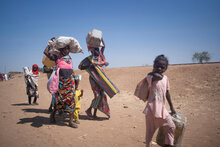WFP Hails Re-Opening Of River Corridor To Supply Vital Food Assistance In South Sudan
A WFP-contracted barge traveling from the Sudanese town of Kosti has offloaded some 450 metric tons of food in the Upper Nile state towns of Renk and Wadakona in South Sudan. The shipment will provide food for an estimated 28,000 people for a month, and is part of an operation launched in November to move food assistance to South Sudan through the Republic of Sudan.
“This is the first time in several years we have been able to use the Nile River to deliver food across the border between Sudan and South Sudan, and we are grateful to everyone who made it possible to re-open this vital supply line,” said WFP Acting South Sudan Country Director Stephen Kearney.
“This will make an enormous difference in our efforts to bring food assistance to people in critical need.”
River transport of humanitarian goods across the border between Sudan and South Sudan largely stopped after the border’s closure following South Sudan’s independence in 2011. The resumption of river transport was made possible by collaboration between the two governments and a recognition by all parties of the importance of facilitating transport of humanitarian assistance to conflict-affected civilians in South Sudan.
In the cross-border operation, WFP is using trucks and river barges to deliver an initial total of 4,650 metric tons of food for South Sudanese affected by conflict as well as for refugees living in camps in Maban County of Upper Nile state. The operation began in November when a convoy of 18 trucks delivered 700 metric tons of food to Renk and Melut.
Now that the corridor is re-opened, WFP hopes to use it to transport into South Sudan an additional 21,000 metric tons of food contributed by the United States, which was recently offloaded in Port Sudan in the Republic of Sudan.
Using river transport through Sudan into South Sudan is cost effective, and helps reduce reliance on air operations. WFP-contracted helicopters and airplanes have completed thousands of flights over the last year in South Sudan carrying food and nutrition supplies, forming a critical lifeline in allowing WFP to reach communities isolated by conflict and washed-out roads. But air transport costs six to seven times as much as moving food by river and road, so the agency is aiming to maximize its use of surface transport as the dry season takes hold.
“We at WFP are starting our annual effort to pre-position food that we know will be critically needed over the coming year, because the threat of a hunger catastrophe remains very real in early 2015 as the dry season takes hold,” said Kearney.
WFP has reached 2.5 million people in South Sudan with lifesaving food and nutrition assistance since the start of 2014.
# # #
WFP is the world's largest humanitarian agency fighting hunger worldwide, delivering food in emergencies and working with communities to improve nutrition and build resilience. In 2013, WFP assisted more than 80 million people in 75 countries.
Follow us on Twitter @wfp_media AND @wfp_africa
For more information please contact (email address: firstname.lastname@wfp.org):
Challiss McDonough, WFP/Nairobi, Mob. +254 707 722 104

